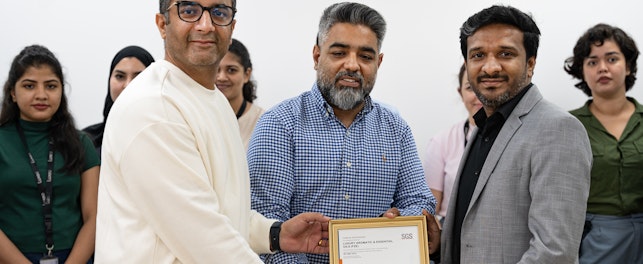The Middle East and Gulf Cooperation Council (GCC) region are increasingly focusing on sustainability across various sectors, including event management. The adoption of the ISO 20121:2024 standard for sustainable event management highlights this trend, providing a framework for integrating sustainability throughout the event planning process.
In partnership with SGS, the world's leading inspection, verification, testing, and certification company, organizations in the Middle East and GCC can now elevate their event sustainability practices to new heights. This article delves into what ISO 20121 entails, its workings, target audience, certification process, and why SGS is your go-to for ISO 20121 in the Middle East and GCC Region.
Understanding ISO 20121: A Keystone for Sustainable Event Management
ISO 20121 is an international standard that provides guidelines for managing events in a sustainable manner. It emphasizes reducing the negative impacts on the environment, economy, and society, thereby promoting a positive legacy.
- Framework for Sustainability: Offers a structured approach for planning and delivering events sustainably.
- Comprehensive Scope: Applicable to all types and sizes of events.
- Continuous Improvement: Encourages organizations to improve efficiency and sustainability.
History of ISO 20121 Updated for Paris 2024 Olympics
Initially launched for the London 2012 Olympics, ISO 20121 has been revised for the upcoming Paris 2024 Olympics, catering to events of all sizes with adaptable complexity.
Key Updates to ISO 20121:2024
- Aligned text and clauses with standardized management systems.
- Enhanced focus on climate impact and organizational context.
- Broader issues like human rights and social impacts.
- Expanded stakeholder engagement including sponsors.
- Commitments to reporting achievements and sustainability in supply chains.
Mechanisms of Implementing Sustainable Event Practices
The ISO 20121 standard operates on a management systems approach, incorporating the Plan-Do-Check-Act (PDCA) cycle to ensure continuous improvement.
- Planning: Establishing objectives and processes to achieve sustainable outcomes.
- Doing: Implementing the processes as planned.
- Checking: Monitoring and measuring processes against policies, objectives, and legal requirements.
- Acting: Taking actions to continually improve sustainability performance.
Identifying the Beneficiaries of Sustainable Event Management
ISO 20121 is designed for any organization involved in the event industry, from small firms to large enterprises, including:
- Event organizers
- Event management companies
- Suppliers and vendors
- Venues
- Clients seeking sustainable event solutions
Sustainable Event Certification: Key Mechanisms for ISO 20121 Compliance
In the process of obtaining ISO 20121 certification, several key sustainability management mechanisms are rigorously assessed, reflecting the standard's comprehensive approach to sustainable event planning and execution:
- Accessibility Enhancements: Evaluation includes measures to ensure all attendees, especially those with disabilities, have access to essential services. This encompasses everything from adequate seating and mobility support to innovative solutions like audio descriptive commentary, ensuring an inclusive event experience.
- Waste Reduction Initiatives: The audit examines practices aimed at minimizing waste, such as employee education on waste reduction, effective segregation techniques, and engaging awareness campaigns, often supported by dedicated sustainability volunteers.
- Eco-friendly Procurement: The focus is on the environmentally conscious procurement of necessary event materials. Criteria assess the use of items made from recycled materials, such as uniforms, and the selection of compostable packaging for food items, to reduce the event's ecological footprint.
- Supplier Compliance Reviews: The certification process includes evaluating social and environmental audits of suppliers to ensure they meet specific sustainable sourcing codes. This ensures that the event's supply chain operates in accordance with established sustainability standards.
- Incident Management and Feedback Loops: Effective governance mechanisms for reporting and resolving incidents during the event are assessed, along with how insights and lessons learned are collected and integrated into future planning. This approach promotes continuous improvement in sustainability practices.
These mechanisms highlight the certification's role in promoting sustainable management practices across various aspects of event organization, ensuring events can achieve a positive impact socially, economically, and environmentally.
Steps to Attaining Certification for Sustainable Event Management
Achieving ISO 20121 certification involves several key steps, ensuring your event management practices meet global sustainability standards.
- Gap Analysis: Assessing current practices against ISO 20121 requirements.
- Planning: Developing a plan to address gaps and integrate sustainable practices.
- Implementation: Rolling out the plan across the organization and its activities.
- Evaluation: Conducting internal audits and reviews.
- Certification: Undergoing an external audit by a certification body like SGS.
SGS: Your Partner for Comprehensive ISO 20121 Certification Services
Events have a significant impact on the environment and economy, affecting water and energy consumption, solid waste production, biodiversity, employment, and supplier selection. Implementing an ISO 20121 sustainability management system is essential for organizations looking to mitigate these impacts while setting and achieving realistic sustainability targets.
Here’s why SGS is the ideal partner for navigating your ISO 20121 certification journey in the GCC:
Local Expertise in Events Sustainability
With our local presence in major Middle East and GCC countries like UAE, Saudi Arabia, Qatar, Oman, Jordan, and Kuwait, SGS showcases event management expertise, guiding organizations toward ambitious event sustainability goals. Highlighted by our collaboration with Qatar 2022, the first FIFA World Cup™ to achieve international sustainability certification.
Education and Training
Beyond certification, SGS is committed to building your team's capacity through education and workshops. These sessions, led by seasoned SGS local professionals, cover the audit and implementation processes of the ISO 20121 standard, equipping your team with the knowledge and skills needed for successful certification.
Assessment and Certification Audits
SGS conducts the necessary assessment and certification audits, providing a seamless path to ISO 20121 certification. This rigorous audit process ensures that your event management practices meet the highest standards of sustainability.
Choosing SGS for your ISO 20121 certification means partnering with a leader in sustainability and certification services. With SGS’s support, your organization can not only achieve certification but also demonstrate a genuine commitment to sustainable event management, setting a benchmark in the industry and contributing positively to the environment and society.
About SGS
We are SGS – the world’s leading testing, inspection and certification company. We are recognized as the global benchmark for sustainability, quality and integrity. Our 99,600 employees operate a network of 2,600 offices and laboratories around the world.
SGS Building, Street no. N 203,
Jebel Ali Free Zone North,
Dubai, United Arab Emirates









